The four imperial guards in their golden raiment retreated outside and, when they shut the huge doors tight, a double boom echoed around him.
Ghassan looked about the mosaic floor. Its polished shapes of colored marble were arranged in a looping, coiling pattern centering upon a single one-step dais three yards in diameter. All of the great chamber was awash with tinted sunlight filtering through a like mosaic of glass panes in the dome above. There was only one other exit: the far doors, of purest ivory slats, with sweeping golden handles as long as his forearms. Beyond those doors would be even more imperial guards than on the route by which he had been brought here.
This was not a place that anyone wished to visit.
Aside from serving as a location where dignitaries met in negotiation with the emperor, it was a place of judgment under the heavens. He was to be judged before the emperor, perhaps for treason—or something worse.
He no longer wore the midnight blue robe of Metaology, for he had been in hiding. His short, dark brown hair with the barest flecks of silver was in disarray: strands dangled to his thick eyebrows above piercing eyes separated by a straight but prominent nose. His borrowed clothing of a plain head wrap, a dusky linen shirt, and dark pants over soft leather boots was little more than that of a wanderer.
When he had been found—however he had been ferreted out—he had not struggled to escape, though he could have. His life might end here in this highest of places, but this was where he needed to be. Among those who might come here, there was one he hoped for ... as the far doors began to open.
Ghassan il’Sänke dropped to one knee and lowered his head and eyes, but not enough to keep from watching those who entered. First came more guards, a dozen at a count, and then the “sovereign” advisors, but only three of the seven always in residence in the imperial palace.
All were either first daughters or second and third sons of the seven kings of the empire. Calling them advisors was proper, for they were the emissaries of their fathers. They were also hostages to keep the royal houses obedient to the imperial throne. But Ghassan took no notice of which were present as another trio entered under the protection of four more imperial guards.
High Premin Aweli-Jama of the guild’s Suman branch was dressed in gray as premin of Cathology. He was flanked by Premin Wôl’ya and Domin il’Bänash, both robed in midnight blue. That the head of Ghassan’s branch had chosen two metaologers to accompany him showed fear of the one to be judged.
Conjury was preferred among Suman metaologers, versus the preference for thaumaturgy in the Numan branch ... and both Wôl’ya and il’Bänash were highly skilled.
Ghassan was versed in conjury as well as the forbidden third magic, resurrected in secret by his sect more than two hundred years ago. And it was feared and reviled throughout the known world.
Suspicion of sorcery was certainly part of why he had been brought here. The presence of the metaologers also suggested to Ghassan that judgment might have already been passed upon him.
The next to enter caused him to stiffen in wariness.
Imperial Counselor Wihid al a’Yamin, personal advisor to the emperor, was in his late seventies, but his eyes—and awareness—were still as sharp as a hawk’s. Unlike many who graced the royal court, he always dressed simply, in tan pantaloons and a cream shirt beneath a sleeveless dark brown robe. By his age, his hair must be white, but he always covered it with a red headwrap, echoing colors worn by the guards—as if he fancied himself to be a warrior or wished to give that impression, although he had never served in the military. His face was lined, and he was stooped with age, appearing frail, but Ghassan was not fooled by this. Counselor a’Yamin was one of the most powerful men in the empire.
Ghassan carefully maintained his composure and gave no notice to the rest of the retinue, but the last to enter shocked him. It was not Emperor Kanal’am.
Prince Ounyal’am, firstborn heir of the imperial throne, watched only Ghassan il’Sänke as he alone stepped up onto the dais and stood at its center.
He was small for his people and darker toned in hair and skin than most, and, at thirty-eight years, he had yet to take even a first wife. This was fodder for gossip in an empire mindful of heirs and with kingdoms always vying for the closest tie to the imperial throne over generations. But even the emperor had not sired his first “legitimate” heir, Ounyal’am, until he was fifty-seven, and Kanal’am was now older than most of his recorded predecessors.
Ghassan bowed his head and lowered his eyes.
“How do you account for the unexplained deaths and disappearances within your order?” the prince demanded.
“I cannot, Imperial Highness ... as yet,” Ghassan answered. “But I assure you that I ... we ... will uncover the truth.”
It was a careful half lie. He could account for such deaths—or most of them—and he dared to raise his eyes a little.
The prince still watched him and briefly flipped his right fingers upward without raising that hand.
Ghassan, tall for his people, rose to his feet but remained silent as he waited upon the prince.
“Untrue, great one!” Aweli-Jama suddenly challenged.
The high premin took two steps closer to the dais’s right side and bowed his head to the prince. But his next words were for Ghassan.
“You know more ... a good deal more!”
As head of Cathology in the Suman branch, Aweli-Jama was elderly, though not too much so. He was reminiscent of a lean and wizened “vizier” pulled from ancient folktales that predated unification and the birth of the empire.
Ghassan remained composed, looking only to the prince. “If I may beg a question, my prince, about the emperor?”
Prince Ounyal’am eyed him coldly. “My father is ... tired ... and has left this matter to my discretion. Now, is your high premin correct? What is this I hear of a hidden sect among the metaologers, including you ... Domin? Is it true that all involved but you are dead?”
Ghassan’s composure began to fracture from within, though he kept his expression and posture relaxed and poised. Who else had been speaking to the prince—or worse, the emperor?
Aweli-Jama would never openly admit to a loss of control inside his guild branch. Although the high premin and all of the premin council had had no knowledge of the sect, let alone its purpose, Aweli-Jama was responsible for all in his branch. He would bear much blame for what had happened, whether he had known or not.
Ghassan would not expose the worst—the unknown part of a nightmare his brethren had faced in their end.
An undead, as invisible as a thought, had escaped them and its captivity. It had killed all of his sect but him, or so it was thought. He had been away when this had happened, and now a monster of a past age was loose among the people ... within the people.
Ghassan quietly scanned the chamber and all of those present.
The “specter,” for lack of any better term, could not survive daylight without a living host, but so many days and nights had passed since its escape. Deaths in the night throughout the city attested to its survival, but who among the people was not who he or she appeared to be?
It could be anyone while hiding in flesh during daylight.
It could be in this very highest of chambers throughout the land.
The prince let out a heavy sigh, pulling Ghassan’s attention.
“Your premin has demanded a list of your sect’s members,” the prince went on, “those dead and those who might have fled into hiding, like yourself. Yet you remain silent on this. It is a matter of time before an account of those who cannot be found would comprise such a list. Why do you not shorten the effort?”
Читать дальше

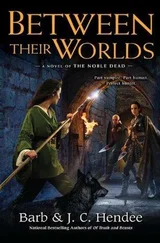

![Барб Хенди - В тени и мраке [СИ] [любительский перевод]](/books/200701/barb-hendi-v-teni-i-mrake-si-lyubitelskij-perev-thumb.webp)
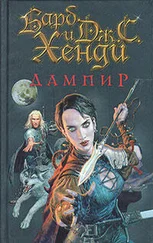
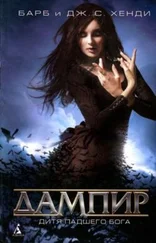
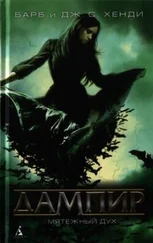
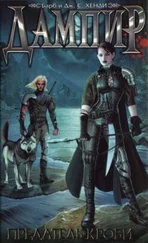
![Барб Хенди - Голос в ночи [ЛП]](/books/397310/barb-hendi-golos-v-nochi-lp-thumb.webp)



